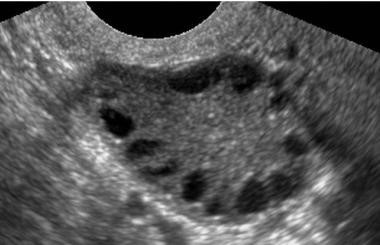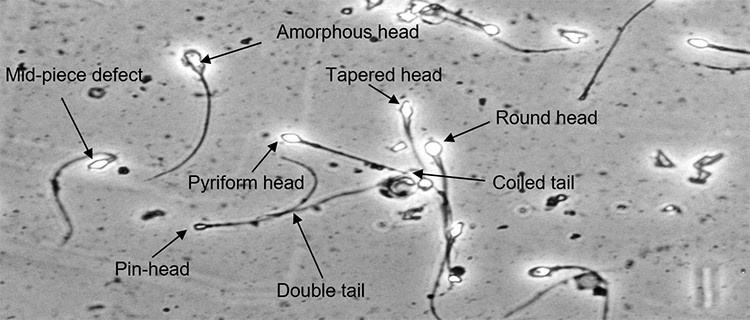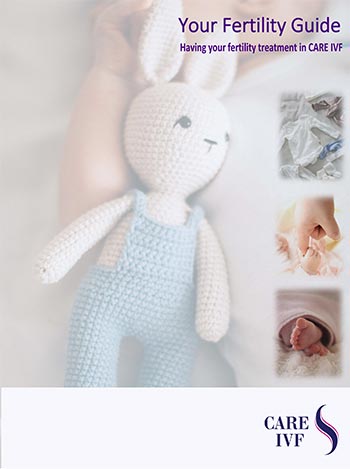Getting Started
Ovulation Predictor
What is Infertility?
Infertility is the inability to get pregnant after one year of trying. It is a common problem that can affect 1 in 7 couples. 80% of couples having regular sex should conceive within one year.
Reasons for Infertility
Approximately 15-20% of couples have difficulties getting pregnant. Female factors are responsible in 40% of the cases, male factors account for a further 40%. There is a combination of female and male factors in the remaining 20% of the cases.
Image: Polycystic Ovary Syndrome (PCOS) with follicles in the peripheral of the ovary

Common female infertility problems:
- Ovulatory problems
- Polycystic ovaries
- Tubal disease or blockage
- Hostile cervical mucus
- Endometriosis
- Genetic Factors
- Uterine Abnormalities
- Premature Ovarian Failure
- Infections
Common male infertility problems:
- Abnormal sperm parameters
- Azoospermia
- Obstruction / Defects of Tubules That Transport Sperm
- Antisperm antibodies
- Hormonal Factors
- Genetic Factors
- Erectile Dysfunction
- Infections

Abnormal Spermatozoa
Unexplained infertility:
Unexplained infertility affects a small percentage of infertile couples. In the majority of these cases, the failure to reach a diagnosis is due to factors which cannot be assessed using conventional tests. In cases of unexplained infertility, assisted conception in the form of IVF is both diagnostic and therapeutic.
Many fertility problems can now be overcome with the advances in medical science.
What is IVF?
IVF or “in-vitro fertilisation” means fertilisation outside the body. It is this method which has helped many women to have babies after the first IVF (test-tube) baby, Louise Brown, was born in 1978. Unless both tubes are blocked, IVF is not usually offered as the first choice of treatment. It is a reasonable option when all alternative treatments have failed with the urgency depending on the age of the woman.
The IVF process starts with ovulation induction and monitoring of follicular development by ultrasound scanning.
At the appropriate time, the eggs are collected and mixed with the sperm in a culture dish or test tube. Fertilised embryos are then left to grow in an incubator for a couple of days to check that they are developing normally. Up to two embryos are transferred into the woman’s womb. If the treatment is successful, one or more embryos will implant in the lining of the womb and a foetus and placenta will develop from the embryo. The woman will then be pregnant just as if she had conceived normally.
Maximising Your Success
Choosing a Fertility Centre
IVF treatments can be stressful and physically demanding and so couples need to be sure it is something they both want to do. To help them understand what is involved and the choices available, they should visit different centres, speak to staff, enquire about the facilities and services.
Why should you choose CARE IVF?
CARE IVF has an experienced team of doctors, nurses, embryologists and technicians, all of whom specialise in fertility. Our centre aims to offer a comprehensive range of fertility treatments and special expertise to assist couples in the best possible way. We fully understand the needs of individual couples facing fertility treatment and seek to respond in a professional and supportive manner.
We also offer the latest and proven scientific and medical skills currently available within this field. We do so in an environment of genuine care, warmth and support for couples. We fully appreciate the stresses and anxieties associated with fertility treatment, we offer easy access for couples undergoing treatment and provide information, understanding and emotional support when most needed.
For further information, please click on ‘About Us‘.
Planning your Pregnancy
During your initial consultation with CARE, we will give you an in-depth guide to planning your pregnancy. It is important that you come with an idea of your menstrual cycle. There are many phone apps that can help you with this. In addition, using an ovulation calculator can also help you determine your fertile window.
Factors Affecting Success of Treatment
This is a commonly asked question and an important one to grasp when seeking fertility treatment. Couples need to be aware of certain factors affecting the success of infertility treatment as this will help you to understand how to maximise your chances of pregnancy.
- Age of the woman
Whether a woman conceives naturally or by assisted conception, her chances of achieving a pregnancy decreases with age. (J Obstet Gynaecol Can; 2011) A woman’s age is the most important factor influencing the success of IVF treatment when she uses her own eggs, according to the Society for Assisted Reproductive Technology (SART), which is the professional organisation for IVF clinics. It is shown that a forty-five year old woman using the eggs of a twenty-five year old donor has the same chances of conceiving as that of a twenty-five year old woman (Fertil Steril. 1997). It is also recognized that the chances of miscarriage increases with the woman’s age (J Obstet Gynaecol Can; 2011). - Quality and number of eggs retrieved / embryos transferred
The chance of success is dependent on the quality of the eggs the woman produces for fertilization, and this directly affects the number and quality of embryos produced. Not every embryo transferred to the uterus will result in a baby. Therefore, the more embryos transferred, the better the chances of becoming pregnant. However, the risk of multiple pregnancies also increases (Minn Med; 2009). Each couple’s individual infertility circumstances will be reviewed when deciding on how many embryos to transfer. Ministry of Health Guidelines in Singapore stipulates that no more than 2 embryos are transferred at any one time. However for patients who are ≥37 years of age and have repeated failed attempts, the centre may transfer up to a maximum of 3 embryos. - Duration of infertility period
This refers to the length of time a couple has been trying to start a family. Statistics have shown that the chances of success in pregnancy are inversely related to the duration of infertility (British Medical Bulletin; 2000). - Previous pregnancies
Women who have been pregnant before, or who have had a previous IVF birth, have a higher chance of conceiving with IVF treatment. The time lapsed from the last pregnancy also influences the chance of success as the uterine receptivity may change and this can decrease the chance of success. - Previous IVF attempts
It has been shown that the live birth rate decreases with the number of failed attempts, especially from those whose repeated treatment did not show improvement in egg, sperm and embryo quality. A woman’s first cycle of IVF carries an average 17.4% success rate, but this dips to 14.4% by the fifth attempt (figures taken from Human Fertility & Embryology Authority (HFEA). We offer couples post-treatment counseling to discuss the outcome of each cycle before embarking on repeated treatments. The most significant factor by far is the woman’s age. As demonstrated in the table below, success rate differs significantly between the women’s age groups. In CARE IVF, we pride ourselves in what we have been able to achieve from the many years of experience in this field. Whilst it is helpful to have an idea of the fertility centre’s success rate when considering which centre to approach, it is important to understand that this only provides an average success rate and does not predict what will happen for each individual patient. Success from IVF treatment differs from patient to patient, and also between each treatment for an individual treatment cycle. - Fresh Cycle Clinical Pregnancy Rate according to women’s age group in CARE IVF:
Women’s Age Cinical Pregnancy Rate <35 49.6% 35–39 years 41.7% >40 22.8% For an individualised predictor of your IVF success rate, it may be helpful to refer to the Society for Assisted Reproductive Technology’s (SART) patient predictor to calculate this. (https://www.sartcorsonline.com/Predictor/Patient).
For further information:
Planning Your Visit
Initial Appointment
The initial appointment involves both partners. The consultation, together with the various tests, lasts about an hour.
We encourage both partners to attend the initial consultation so that both are equally involved in the discussions and the decision-making.
A semen test is normally carried out prior to the consultation, so it is best if intercourse is avoided for two to three days beforehand. It is preferable that the semen test is performed before the appointment with the doctor so that the results can be discussed during consultation.
Following the consultation with the doctor, each couple is seen by a specialist nurse or counsellor, who is able to further discuss any details of the treatment.
Further Assessment
At the initial consultation, the doctor will discuss fully the nature of the fertility problem, the treatment options available and whether a further assessment is needed prior to starting treatment.
Many couples referred to our centre have undergone extensive infertility tests elsewhere. This may mean that we do not have to repeat some of the tests. In most cases however, a semen analysis will be repeated in our laboratory. Prior to commencing any treatment, an assessment ultrasound scan will also be performed to examine the state of the ovaries and uterus.
In some cases, abnormalities are revealed on the pre-treatment ultrasound scan, which may require further investigation, such as laparoscopy or hysteroscopy. This will give us better information on the ovaries and uterus. We may also recommend a hysterosalpingogram (HSG) by which a dye is passed through the cervix into the uterus or fallopian tubes to reveal the extent of any tubal damage. If any of these procedures were performed before, it may not be necessary to repeat them.
Treatment Options
Below are a brief list of services we offer which range from simple fertility investigations to highly complex treatments. We recommend you to contact our centre to discuss these options in more detail.
- Fertility Counseling
- Fertility Screening and Investigations
- Semen Analysis
- Ovulation Induction
- Intrauterine Insemination (IUI)
- In-vitro Fertilisation (IVF)
- Sperm and Egg Donation Programme
- Assisted Hatching
- Sperm, Egg and Embryo Cryopreservation
- Surgical Sperm Retrieval
- Gynaecology Surgery
Further options can be found on ‘Services’ section.
CARE IVF Handbook: Step-By-Step Guide
Click below to download our handbook detailing an in-depth information and a step-by-step guide to fertility treatment.
Need A Helping Hand?
Drop us a line anytime, and one of our staff will respond to you as soon as possible
